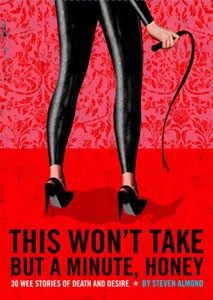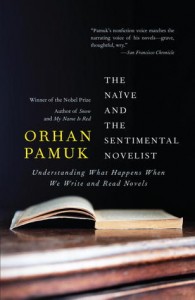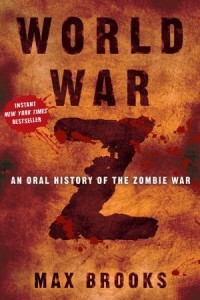On days when I’m feeling more like a book reviewer than a novelist, I read books about writing instead of novels. This writing advice from authors usually helps me get back into the writing spirit. When talking about their relationships with their writing, almost everyone hits at least one note that feels familiar, and I find comfort in the camaraderie. This week I had the wonderful luck to catch two completely different takes on writing from Steve Almond and Orhan Pamuk. Though wildly divergent, they were perfect complements to one another.
This Won’t Take But a Minute, Honey
I first found out about Steve Almond through The Lit Series at Richard Hugo House. In preparation for the event, I watched his video about Toto’s “Africa.”
And then I watched the video again. And again. And again. Almond’s reading at Hugo House was thoughtful, creative, and irreverent, and I picked up this tiny, self-published book, This Won’t Take But a Minute, Honey without even caring what precisely it was about.
About the Book
 I finally started reading the book this week because I had 20 books left to read to meet my 2012 reading goals and I thought I could power through the 70 pages and move on to the next thing. I was so completely wrong.
I finally started reading the book this week because I had 20 books left to read to meet my 2012 reading goals and I thought I could power through the 70 pages and move on to the next thing. I was so completely wrong.
Instead, I found myself immersed in these sassy essays about what it means to be a writer. Starting with the wonderfully self-deprecating “Potentially Truthful Statements Regarding My Other Books,” the comments on creativity were not only spot-on, they were hilarious and useful for artists of all stripes. The book was too good not to share, so I read most of it aloud to my husband. When he left the room, I read it to myself first and then read to him again when he came back.
Steve Almond Kicks My Writing Ass
Almond calls us writers out in true tough love fashion on the things that make us writers—the messianic ego and withering self-criticism—and on the things we must cultivate—the bullshit detector. But he’s not standing on the sidelines telling us to be better writers, he’s condensing all the things we already know and he’s saying, “I’ve been there. And you really do have to fucking do this.” That’s not actually a quote, but it could be. Foul-mouthed and real, the essays bleed into one another and build toward this fantastic and tiny writing boot camp.
”For the rest of us, writing is basically flagellation, an undertaking that promises ecstatic release, but mostly feels like torture. I will do anything to avoid writing. I hate every second of it. The only part of the process I like is having written” – Steve Almond
Once you’ve read all the essays, you’ll realize you can flip the book over for a quick selection of stories.
The Naïve and Sentimental Novelist
 I picked up The Naïve and Sentimental Novelist by Orhan Pamuk later in the week because of the author, not because I thought I still needed a shove towards writing. If you have been reading this blog for a while, you know how much I love Pamuk—in fact, there he is, quoted at the very top of this page, just below “A Geography of Reading.” He is perhaps the writer I feel most akin to in all the world—an intellectual who struggles to find his inner artist and who blends politics and humanity in his work. I kind of love him. Mostly I want to be him.
I picked up The Naïve and Sentimental Novelist by Orhan Pamuk later in the week because of the author, not because I thought I still needed a shove towards writing. If you have been reading this blog for a while, you know how much I love Pamuk—in fact, there he is, quoted at the very top of this page, just below “A Geography of Reading.” He is perhaps the writer I feel most akin to in all the world—an intellectual who struggles to find his inner artist and who blends politics and humanity in his work. I kind of love him. Mostly I want to be him.
About the Book
I’ve read nearly everything Pamuk has had translated into English, but I hadn’t yet read The Naïve and Sentimental Novelist, his collected Norton Lectures. It was the right size to finish during this reading challenge (I can read about 200 pages in a day) so I stopped saving it for later and dove right in.
Orhan Pamuk Appeals to My Inner Reader
Pamuk starts out from the point of view of a reader and looks at how we experience books as we read them. As writers, we are first readers and all the books we have ever read have been teaching us, but sometimes it’s easy to forget that we are building experiences for people like us. We don’t have to write with our audience in mind, but we should be aware of the effects we are creating on the page.
Pamuk goes on to talk about the ways we blend fiction and reality and whether we really want to even separate the two. He also covers topics like experiencing the world through the eyes of a character unlike you, how we visualize when reading, and writing to the center of the story as a search for the meaning of life. It’s a beautiful book and also very personal. My copy is heavily underlined already and I look forward to visiting it again and again.
“The experienced novelist goes along knowing that the center will gradually emerge as he writes, and that the most challenging and rewarding aspect of his work will be finding this center and bringing it into focus” – Orhan Pamuk
I have 12 books left to read this year, and then I’m going to get back to writing that next book. Pinkie swear.
Other Resources for Writing Kinship
- Bird by Bird by Anne Lamott. If you are a beginning writer, start here. She will teach you that you have a voice and all you need is to start putting words on a page, one by one.
- The Paris Review Interviews (also collected as Writers at Work). For fifty years The Paris Review has been interviewing the big names in fiction, poetry, memoir, screenwriting ,and playwriting about what it means to be a writer. Whether you read them individually or read a slew at once, you will see yourself on the page.
- Letters to a Young Poet by Rainer Maria Rilke. Generations of writers have taken solace in and courage from these thoughtful letters from a master to a novice.
- The Triggering Town by Richard Hugo. These essays on writing and poetry could only have been written by a teacher who loved teaching.
- Other writers. If you do not have a writing group or buddy, find one. Surround yourself with people who challenge you but also get you. I have both a critique group and a writing buddy, plus I am lucky enough to be surrounded by writers. These are the people who remind me that I am not alone, even though my work must be completed in solitude.
Leave me a quick note in the comments to share your favorite sources for writing kinship and then get your ass back to writing.
Pick up a copy of The Naive and the Sentimental Novelist from Bookshop.org. Your purchase keeps indie booksellers in business and I receive a commission.
 I’m so excited to finally be reviewing World War Z: An Oral History of the Zombie War by Max Brooks. On Saturday, I watched the piling masses of zombies and Brad Pitt in the preview for the film (on the front of Twilight) and rushed home to steal the book from my husband and start reading. The rest of the weekend was me avoiding everyone (including the aforementioned husband) so I could read, read, read.
I’m so excited to finally be reviewing World War Z: An Oral History of the Zombie War by Max Brooks. On Saturday, I watched the piling masses of zombies and Brad Pitt in the preview for the film (on the front of Twilight) and rushed home to steal the book from my husband and start reading. The rest of the weekend was me avoiding everyone (including the aforementioned husband) so I could read, read, read.